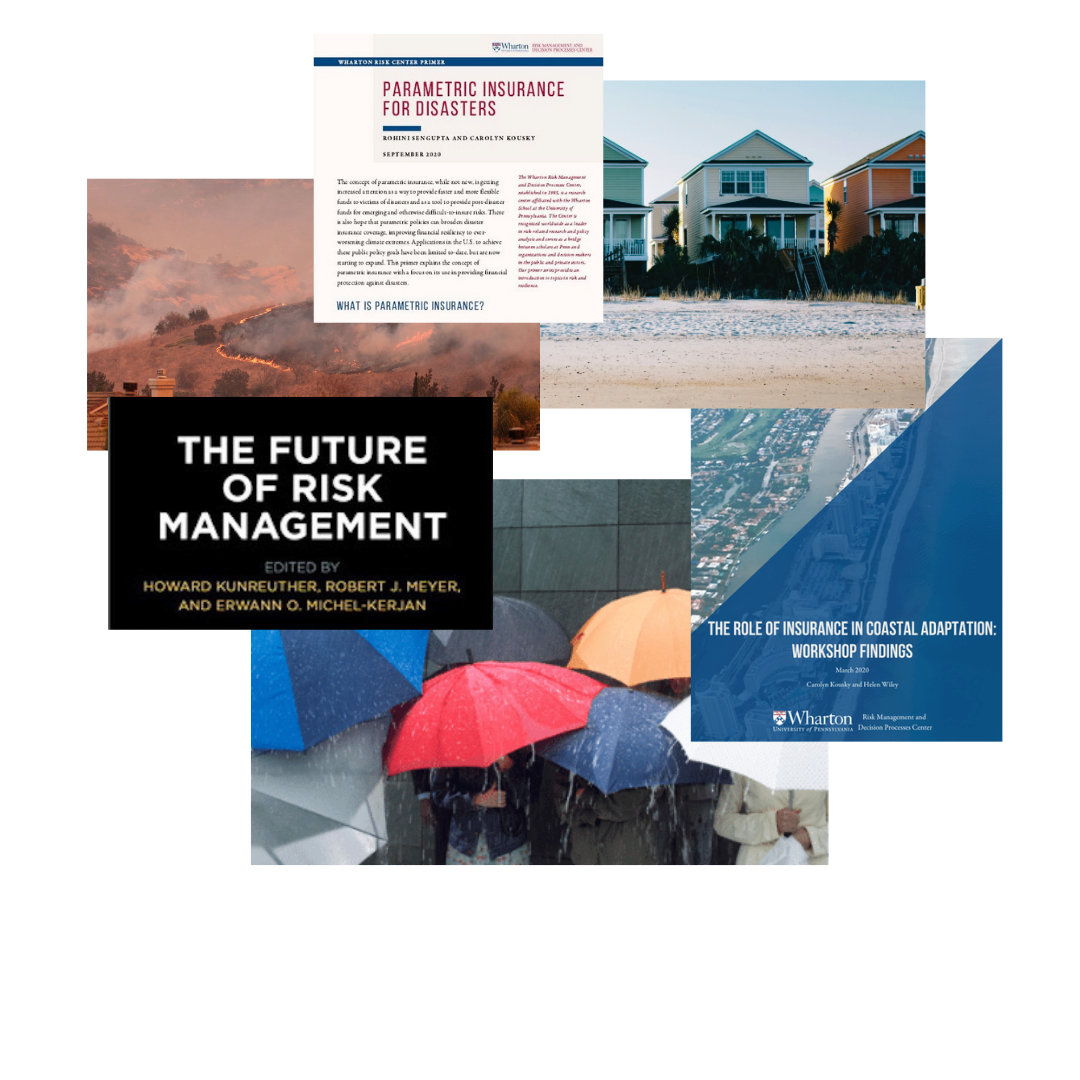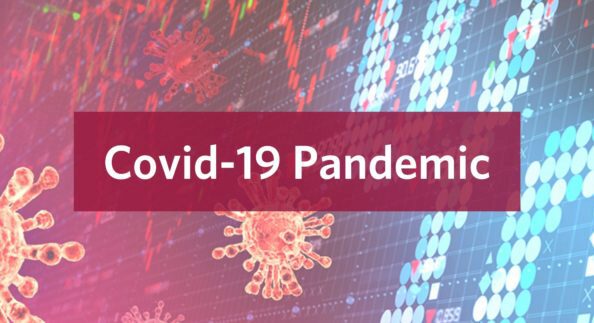Letter from the Directors
As we write this, the world is still struggling to manage a global pandemic, as well as the devastating economic downturn. Organizations must respond not just to a public health crisis, but escalating cyber risks as the world has increased remote interactions; widening inequality; materializing climate impacts, such as record-breaking natural disasters from wildfires to hurricanes; as well as civil unrest and refugee and humanitarian crises.
It is perhaps an understatement to say that this year has radically highlighted the importance of sound risk governance, accurate risk communication, and risk financing for catastrophic losses. At the Wharton Risk Center, we maintain a commitment to cutting-edge research on these topics and are enhancing our connections and partnerships with the private and public sectors in collaborative efforts that identify and support solutions. We are grateful for the support of our sponsors and research partners for making our work possible.
In this year’s Annual Report we are pleased to share our work since we last came together. The Wharton Risk Center has launched a critically important new lab: our Business, Climate, and Environment Lab, led by Sarah Light and Arthur van Benthem. We have been inspired by the current engagements seeking resiliency-enhancing public policy innovation through the Policy Incubator. We have been uplifted by our inaugural class of undergraduate fellows at the Center. And, as always, we are impressed by the depth and breadth of research being undertaken by our affiliated scholars. We hope you enjoy learning about all these things in this report and through our website.
We look forward to continuing our work together.
Howard Kunreuther, Robert Meyer and Carolyn Kousky.
![]()

![]()
Research Labs
The Risk Center has continued to define and expand the work in our five Research Labs. The Labs collect research and engage with others around the core topics. Work by affiliated scholars is showcased on our Lab webpages.
Business, Climate, and Environment Lab
The Risk Center’s new Business, Climate, and Environment Lab, headed by Arthur van Benthem and Sarah E. Light, aims to centralize Wharton’s research and teaching on business, climate and the environment. The Lab acts as a go-to place for these topics at Wharton, and disseminates cutting-edge research to stakeholders from academia, government, and the private sector. The Lab is taking on an expanding number of projects aimed at informing public and private climate policy; recent work includes explorations of building climate resilience, carbon trading policy, transportation policy, and environmental policy in emerging markets. Learn more about this Lab.
Disaster Risk Management Lab
This year has seen record-breaking disasters, from wildfires to hurricanes, in addition to the continued fight against COVID-19. The Disaster Risk Management Lab, led by Carolyn Kousky, has been pursuing multiple projects on how we can improve our management of these events and strengthen our recovery. Recent work has explored novel insurance solutions to climate change, including parametric insurance and community-based insurance; the fiscal impact of wildfires on municipal revenues and expenditures; and the possibility of insuring nature. Explore this Lab’s research.
Risk Communication and Decision-Making Lab
To better understand and improve individual and collective decision-making in the presence of uncertainty, the Risk Communication and Decision-Making Lab investigates different approaches for framing and providing risk information to improve preparedness and response to future adverse events. Led by Howard Kunreuther, this Lab’s projects are looking at how default options affect insurance demand, how descriptive social norm-nudges increase flood preparedness among homeowners, and whether people have a bias for insurance with low deductibles. During the past year, the Lab has focused on the role of risk perception and biases in dealing with the pandemic, and take-aways on what we can learn from the COVID-19 pandemic to address climate change. Read more about this Lab.
Behavioral Science and Technology Lab
The Behavioral Science and Technology Lab studies the impact of consumer technology on our lives, and applies these insights to a range of initiatives to enhance public welfare. Led by Robert Meyer, the research includes building systems that identify and control the spread of false information, improve disaster preparedness, and quantify the phenomenon of psychic numbing using natural language techniques to analyze news articles and social media. This year, the Lab hosted the 2020 Behavioral Insights from Text conference, which brought together scholars using natural language processing to better understand human behavior. Check out the Lab’s projects.
Political Risk Lab
In a year of unprecedented political changes amid a global pandemic, the Political Risk Lab has been undertaking a program of activity that explores the relationship between corporate performance and political risk management. Recent work, led by Witold Henisz, has included the 2020 EY-Wharton Survey Report “Geostrategy in Practice,” presenting “Integrating Political Risk into Corporate Strategy” at the US-China Series Virtual Conference Panel and developing a new measure to assess companies’ external engagement. See other Lab projects.

“Natural areas could be insured against possible damage or degradation just like real property.”
— Carolyn Kousky and Sarah Light. January 31, 2020. Climatewire
Over the past year researchers affiliated with the Wharton Risk Center have written op-eds, joined podcasts and been quoted in major news outlets. Read and listen to these on our Media page.
Connections to Penn
2020 brought many new initiatives. Alongside the Center’s long-running Russell Ackoff Doctoral Student Fellowship Grants Program, this fall the Risk Center welcomed our 2020-21 inaugural cohort of 20 Undergraduate Fellows and continued to participate in annual events like PennApps – one of the largest student-run hackathons in the world. This year we also launched our Business, Climate, and Environment Lab; our expanded climate work was discussed by Wharton Magazine. The Center has also taken a new role in supporting environmental majors at Wharton. We also continue to partner with faculty and other centers across the school, such as through our Climate Risk Solutions project this past year. Learn more about these programs and our additional student research and engagement activities on our Education page.
“The downturn started in 2013, and no one noticed. It means that coastal housing is in more distress than we thought.”
– Benjamin Keys. October 12, 2020. The New York Times.
Outreach and Engagement
Over the past year, the Wharton Risk Center has continued to share our research findings with industry partners, representatives from the public sector, scholars, and students through our publications, events, and other outreach activities. We also continue to expand our presence on social media.
We regularly feature innovative risk and resilience ideas, offer timely policy insights and opinion pieces, and introduce new research on our blog. Visit our Lab Notes page.
Over the past year, researchers affiliated with the Wharton Risk Center have published papers, reports, issue briefs and articles. Find them on our Publications page or Lab pages.
The world continues to struggle with the spread of the coronavirus and the impacts are rippling through the global economy. Sound risk management is more important than ever. At the Wharton Risk Center, we engage with our partners to meaningfully support the management of evolving threats, such as this one. See resources here.
“Aside from the coronavirus pandemic, the biggest, most destructive exponential growth processes that we must grapple with today are those associated with global climate change.”
— Howard Kunreuther and Paul Slovic, Politico
Public Policy
The Wharton Risk Center seeks to inform better public policy through its research projects and through ongoing engagement with decision-makers at all scales of governance. These efforts both support the design and implementation of evidence-based policy and also ensure that our research agenda meets the most pressing needs of public risk managers. Center researchers meet with policymakers, serve on advisory panels and national committees, and disseminate policy-relevant findings in many formats.
Policy Incubator
The Policy Incubator supports novel approaches for increasing resilience through the development of visionary ideas, encouragement of innovative thinkers, and the advancement of workable on-the-ground solutions. This year, the Incubator has dived deeper into our projects on developing novel insurance solutions to climate change. Learn more about the Incubator, current projects, and partners.
Public Sector Involvement
The Risk Center serves as a bridge between scholars at Penn and organizations and decision-makers in the public sector. By engaging in active collaborations with civic partners and non-governmental organizations, including through research projects, serving on working groups or advisory councils, and additional activities, the Center seeks to help inform public policy. Explore our current partnerships.
Digital Dialogues
Our Digital Dialogues are an online forum for policy experts of varying backgrounds and affiliations to propose and discuss innovative solutions to resilience challenges. Our most recent dialogues explored ideas for Scaling up Coastal Ecosystem Protection and Improving Disaster Recovery for Low Income Households. Read all our Digital Dialogues and learn more about the participating scholars.
FEMA PrepTalks
FEMA PrepTalks are given by subject-matter experts and thought leaders to spread new ideas, spark conversation, and promote innovative leadership for the issues confronting emergency managers over the next 20 years. Howard Kunreuther and Carolyn Kousky were both invited to give a PrepTalk in January 2020.
Dr. Howard Kunreuther: “Human Biases: Why People Underprepare for Disasters”
Howard Kunreuther discusses the processes and biases in decision-making under uncertainty. He also proposes a behavioral risk audit that couples protective decision-making with economic incentives, enabling individual and collective actions to achieve greater resilience.
Dr. Carolyn Kousky: “Harnessing the Power of Disaster Insurance”
Carolyn Kousky demonstrates the essential role of insurance in disaster recovery. She explains why not enough people have insurance coverage and offers suggestions for how the public and private sectors can work together to overcome challenges to increasing insurance coverage across America.



